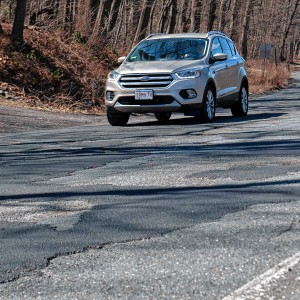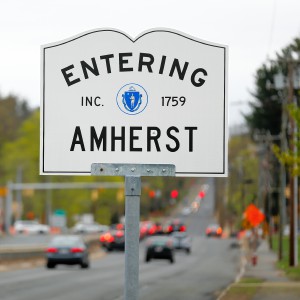Westhampton residents raise privacy concerns about PD request for license plate recognition camera

Westhampton Public Safety Complex 04-13-2023
| Published: 11-12-2024 4:18 PM |
WESTHAMPTON — Some residents are raising concerns about a Police Department request to buy an automatic license plate recognition camera, arguing that the idea could be an unnecessary violation of privacy.
Police Department officials, however, say that the camera would allow law enforcement to better monitor vehicles entering and exiting the town, noting that the cameras do not collect biometric data such as who is within the vehicle.
The camera in question is called the “Falcon,” a stationary camera by the company Flock Safety that would be installed at an entry point into Westhampton. The camera is designed to document the license plates of cars that pass by, as well as the vehicle’s “fingerprint,” made up of distinguishing characteristics such as the car’s make and model and the presence of any bumper stickers, roof racks or other accessories.
Police liken the camera to having an additional officer stationed at the town entrance 24/7, but some community members are uneasy about what happens with the collected data — an issue with these cameras that the American Civil Liberties Union had previously flagged as requiring more regulation.
Sgt. Jeff Fish of the Westhampton Police Department said at a Nov. 4 Select Board meeting that the camera would allow for more “proactive” policing, but specified that officers will not be able to watch live feeds through the camera. Rather, the camera would allow officers to investigate suspicious vehicles by searching the camera logs for the vehicle’s “fingerprint” characteristics, or looking through a log of the vehicles that passed the camera during a prescribed time frame.
Additionally, if a vehicle is flagged as stolen or associated with an amber alert, silver alert or other concern through national databases like the FBI’s National Crime Information Center (NCIC), the camera will send alerts to officers when such a vehicle passes by.
Camera owners can also create their own “hot lists” of vehicles to be alerted about should they pass by.
Fish said if the town purchased the camera, they would own it outright, but it would cost $3,500 yearly. Flock Safety describes this as a “subscription fee” for the camera’s services and maintenance, according to information on its website.
Article continues after...
Yesterday's Most Read Articles
 Northampton Housing Authority boss placed on leave
Northampton Housing Authority boss placed on leave
 Hopeful buyers emerge for Magic Wings butterfly conservatory in South Deerfield
Hopeful buyers emerge for Magic Wings butterfly conservatory in South Deerfield
 UMass Chancellor Reyes outlines changes amid financial uncertainty under Trump administration
UMass Chancellor Reyes outlines changes amid financial uncertainty under Trump administration
 Ready to roll on roads: Amherst priority list tees up $4.55M to rebuild some of town’s worst stretches
Ready to roll on roads: Amherst priority list tees up $4.55M to rebuild some of town’s worst stretches
 UMass hockey: Minutemen fall to Western Michigan, 2-1, in Fargo Regional final
UMass hockey: Minutemen fall to Western Michigan, 2-1, in Fargo Regional final
 Amherst School Committee OK’s budget with no classroom layoffs, but spending plan is $500K more than town recommends
Amherst School Committee OK’s budget with no classroom layoffs, but spending plan is $500K more than town recommends
Fish also assured the handful of community members gathered at the meeting that the cameras do not collect biometric data such as who is within the vehicle.
“It gathers facts about vehicles, not people,” he said.
Fish added that the camera simply takes a picture of the license plate — it doesn’t automatically upload information to any database or run the plate through RMV records. It doesn’t alert law enforcement of any warrants, tickets or other infractions associated with the plate, and law enforcement cannot issue speeding tickets based on data gathered by the camera. For data from the cameras to be added to the NCIC, officers must enter it manually.
In short, Fish explained that the camera would not collect “actionable data,” but would rather aid law enforcement in starting an investigation. He also said that around 70 other communities throughout the state have adopted these cameras. For example, the Easthampton Police Department purchased two Flock Safety cameras in 2023.
But, actionable or not, community members wondered what would happen to the data collected, especially after seeing online that Flock Safety boasts giving camera owners access to a “local, state, and nationwide network of LPR cameras, with over 1B+ additional plate reads monthly,” on its website.
One Westhampton resident, Sue O-Rourke, saw mention of this “national database” online and became immediately concerned. She said she was “uncomfortable” with that level of surveillance, and that she didn’t want local data being shared on such a wide scale.
Another resident, Deborah Estelle, raised similar concerns about this database and about Flock Safety’s access to the data.
“They could sell that data,” she said. “It seems like an invasion of privacy.”
Fish said that data from the camera would be stored for 30 days before being automatically wiped, and that the information does not go out to a third-party entity, nor would Flock Safety have access to it.
Connor Metz, a spokesperson for Flock Safety, confirmed with the Gazette that this is accurate. He said from Flock Safety cameras is stored using an encrypted Amazon cloud service called AWS GovCloud, before being wiped automatically after 30 days. Agencies can alter the storage duration to make it longer or shorter, though.
As for the nationwide network of LPR cameras, camera owners have the option to opt into the network, sharing their data and getting access to additional data in return, but the data sharing is not automatic.
“If agencies want to share data, they have to sign a memorandum of understanding,” said Metz.
Additionally, Metz said that Flock Safety does not access the data or hold any claim over it.
“It’s all owned entirely by the law enforcement customer,” he said.
However, attendees at the Nov. 4 Select Board meeting were not comforted by what they heard, and some expressed that they were not convinced of the need for the camera as it wouldn’t address the area’s main safety hazard of speeding.
In a 2022 report by the ACLU referenced by some of those at the meeting, Flock Safety is described as building a “mass-surveillance system” through the proliferation of these cameras. The ACLU says in the report that this surveillance system, which includes private camera owners such as local homeowners associations, could be used to track individuals for purposes such as deportation or otherwise building profiles based on individuals’ presence in certain areas or spaces.
Additionally, the ACLU contends that the NCIC database is rife with inaccuracies, and that the use of such surveillance data has been proven to disproportionately impact marginalized communities.
“And the risk of abuse by government is all too real,” the report says about the use of this technology. “Unfortunately, this country has a long tradition, extending up to the present, of law enforcement targeting people not because they’re suspected of criminal activity but because of their political or religious beliefs or race.”
The report also raises concerns that, while Flock Safety makes promises about the storage, longevity and security of collected data, there is little assurance that they are held accountable to such promises.
“For one thing, there are no checks and balances on the use of this database. The lack of proper checks on the behavior of law enforcement is well established — and studies suggest improper use of ALPR in particular may be widespread,” the report reads. “Nor are there adequate checks on Flock. The company says it only keeps ALPR data for 30 days, but no laws require them to honor that promise. The company controls an enormous data set that could probably be monetized in various ways — and while the company is growing fast now, boom times never last forever.”
In a more recent ACLU article, released in March, it is reported that “Flock has steadfastly refused to allow the independent security technology reporting and testing outlet IPVM to obtain one of its license plate readers for testing, though IPVM has tested all of Flock’s major competitors.”
Flock Safety declined to comment on this matter.
The article goes on to advise that “communities considering installing Flock cameras should take note. That is especially the case when errors by Flock and other companies’ license plate readers can lead to innocent drivers finding themselves with their hands behind their heads, facing jittery police pointing guns at them. Such errors can also expose police departments and cities to lawsuits.”
By the conclusion of the Nov. 4 meeting, the Westhampton Select Board decided that more research on the proposed Flock Safety technology would have to be conducted before a decision could be made.
Fish and members of the Select Board discussed needing more concrete details on the use of the camera, the funding required to utilize it and how secure the collected data would be.
Alexa Lewis can be reached at alewis@gazettenet.com.






 MTA president offers ways for legislators to address ‘unprecedented dangers’ to K-12 education in state
MTA president offers ways for legislators to address ‘unprecedented dangers’ to K-12 education in state Nearly all of South Hadley High’s student body holds ‘walkout to walk-in’ rally to oppose cuts, call for funding reform
Nearly all of South Hadley High’s student body holds ‘walkout to walk-in’ rally to oppose cuts, call for funding reform ‘Wallace the Brave’ tumbles onto Gazette comics page
‘Wallace the Brave’ tumbles onto Gazette comics page ‘For the love of music’: Florence Community Band set to hold first-ever multigenerational concert
‘For the love of music’: Florence Community Band set to hold first-ever multigenerational concert
